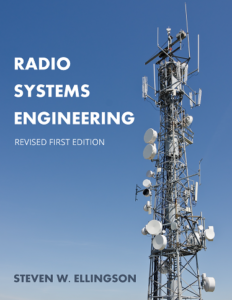Open@VT
Open Access, Open Data, and Open Educational Resources
Announcing: Radio Systems Engineering, Revised First Edition

The Open Education Initiative at Virginia Tech is pleased to announce the release of an openly-licensed, revised first edition of Radio Systems Engineering by Steven W. Ellingson.
Radio Systems Engineering, Revised First Edition https://doi.org/10.21061/radiosystemsengineering-revised1st is lightly updated from the version published in 2016 by Cambridge University Press (ISBN 9781107068285). While Cambridge retains rights to continue to sell and license their print and electronic versions, Cambridge has granted the author enough rights to update and release the book freely under a Creative Commons Attribution NonCommercial International License (CC BY NC 4.0).
What’s new?
- – Lightly updated from the Cambridge first edition to correct known errata, minor issues with text and figures, and to present examples in color highlight boxes and additional figures in color.
- – 531 pages
- – Freely available at https://doi.org/10.21061/radiosystemsengineering-revised1st
- – Released under a Creative Commons Attribution NonCommercial (CC BY NC 4.0) license
- – Available for order in print (softcover, color interior) here
About the Book
Using a systems framework, Radio Systems Engineering, Revised First Edition provides a clear and comprehensive introduction to the performance, analysis, and design of radio systems for students and practicing engineers. Presented within a consistent framework, the first part of the book describes the fundamentals of the subject: propagation, noise, antennas, and modulation. The analysis and design of radios including RF circuit design and signal processing is covered in the second half of the book.
“This textbook gives engineering students a complete overview of radio systems and provides practicing wireless engineers with a convenient comprehensive reference.” Patrick Roblin, Ohio State University
Key features
- – Numerous examples within the text involve realistic analysis and design activities, and emphasize how practical experiences may differ from theory or taught procedures.
- – RF circuit design and analysis is presented with minimal involvement of Smith charts, enabling students to more readily grasp the fundamentals.
- – Both traditional and software-defined/direct sampling technology are described with pros and cons of each strategy explained.
Table of Contents
Chapter 1: Introduction
Chapter 2: Antenna Fundamentals
Chapter 3: Propagation
Chapter 4: Noise
Chapter 5: Analog Modulation
Chapter 6: Digital Modulation
Chapter 7: Radio Link Analysis
Chapter 8: Two-Port Concepts
Chapter 9: Impedance Matching
Chapter 10: Amplifiers
Chapter 11: Linearity, Multistage Analysis, and Dynamic ange
Chapter 12: Antenna Integration
Chapter 13: Analog Filters & Multiplexers
Chapter 14: Frequency and Quadrature Conversion in the Analog Domain
Chapter 15: Receivers
Chapter 16: Frequency Synthesis
Chapter 17: Transmitters
Chapter 18: Digital Implementation of Radio Functions
Appendix A: Empirical Modeling of Mean Path Loss
Appendix B: Characteristics of Some Common Radio Systems
How to Access the Book
DOI: https://doi.org/10.21061/radiosystemsengineering-revised1st (PDF high and low-resolution versions)
ISBN (PDF): 978-1-957213-76-7
ISBN (HTML): 978-1-957213-77-4 [Screen-reader friendly version expected summer 2024]
ISBN (print): 978-1-957213-75-0 [coming soon]
Permanent handle: https://hdl.handle.net/10919/116783 (PDF high and low-resolution versions)
The book is also listed in the Open Textbook Library, OER Commons, VIVA Open, and Merlot.
Considering this book for a course?
Instructors reviewing, adopting, or adapting this textbook are asked to please help us understand your use of the material by filling out this form https://bit.ly/interest_radiosystemsengineering_revised1st.
Suggested citation
Ellingson, Steven W. (2023). Radio Systems Engineering, Revised First Edition. Blacksburg. https://doi.org/10.21061/radiosystemsengineering-revised1st. Licensed with CC BY NC 4.0.
About the Author
Steven W. Ellingson is an Associate Professor of Electrical & Computer Engineering at Virginia Tech. He received the Ph.D. degree in Electrical Engineering from the Ohio State University. He held senior engineering positions at Booz-Allen & Hamilton, Raytheon, and the Ohio State University ElectroScience Laboratory before joining the faculty of Virginia Tech. His research is in the areas of antennas and propagation, applied signal processing, and radio frequency instrumentation, with funding from the U.S. National Science Foundation, National Aeronautics and Space Administration, the Defense Advanced Research Projects Agency, and the commercial communications and aerospace industries. Dr. Ellingson serves as a consultant to industry and government on topics pertaining to radio frequency systems. Ellingson is also the author of peer-reviewed, open textbooks, Electromagnetics Volume 1 & Volume 2 published by Virginia Tech Publishing in 2018 and 2020.
License
![]() Unless otherwise noted, this work is released under a Creative Commons Attribution NonCommercial (CC BY NC) 4.0 license which allows adaptation and redistribution with attribution for uses which are not primarily commercial. See the license terms and best practices for attribution for additional information.
Unless otherwise noted, this work is released under a Creative Commons Attribution NonCommercial (CC BY NC) 4.0 license which allows adaptation and redistribution with attribution for uses which are not primarily commercial. See the license terms and best practices for attribution for additional information.